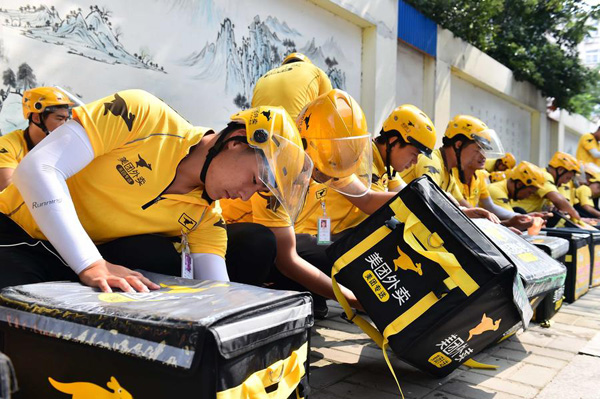
Photo:Xinhua
Meituan-Dianping enters fray with services in seven Chinese cities
Chinese group-buying and dining information platform Meituan-Dianping has launched its ride-hailing services in seven cities along with a series of tempting policies, making no secret of its strong desire to challenge Didi Chuxing and others in the country's burgeoning ride-hailing market.
To attract more potential users, the company is offering customers three coupons of 13 yuan ($2) each, which equals to the flag-down fare of a taxi in China. Drivers who join the platform early can also avoid commission charges and keep the entire earnings for the first three months.
Such tantalizing subsidies are set to intensify the cutthroat competition and price war in the Chinese ride-hailing market, with incentives being the trump card for firms to grow user numbers. According to analysts, the scenario is akin to the competition seen in 2015 when major players such as Didi Chuxing, Uber Technologies Inc, Shenzhou Zhuanche and Yidao Yongche, poured billions of dollars on subsidies.
Meituan-Dianping started small-scale trial operations of its services in Nanjing since February last year and has spent around 600 million yuan on subsidies within 10 months. Drivers will be awarded 60 yuan if they finish eight orders a day and 150 yuan for 20 orders, which will help drivers gain at least an extra 1,800 yuan every month.
Direct subsidies are not the only incentives being offered to users and drivers. Yidao Yongche, a premium Chinese ride-sharing company, has returned to the competition by lowering commission charges in seven cities from 21 percent to 5 percent.
"Spending money can bring some profits to customers and drivers, but in the long term it is not a sustainable way," said Li Yi, chief researcher at the internet research center of Shanghai Academy of Social Sciences. "China's ride-hailing market is entering the second phase of development. The market will become more rational in the end."
According to a report from Jiguang, a data service provider, Didi Chuxing, with a penetration rate of 11.3 percent, ranked first in the Chinese ride-hailing services sector in the third quarter of 2017, followed by Shenzhou Zhuanche, the chauffeured service of UCAR Inc, with a penetration rate of 1.16 percent.
By virtue of its unassailable position, Didi seems to be unruffled in this round of "price wars". "If you want war, you will get war," said Cheng Wei, the co-founder and CEO of Didi in a recent interview with Caijing, a prominent business magazine.
"From Kuaidi to Uber China, we have brought down countless rivals," he said. "We have a bright future ... Meituan-Dianping is not the weakest, nor the strongest either."
Wang Xiaofeng, a senior analyst with research firm Forrester, said: "Didi Chuxing is still the leader in the Chinese ride-hailing market and it is not easy for others to dislodge it from that position in a short time. It is hard to say whether Meituan-Dianping has the required credentials to surpass the former."
"To win market share, user experience is still an important factor. Currently in China, supply is still short of demand. Those who provide more resources at less cost will become competitive and the ones that offer better services will be more used by customers," she added.
Meituan-Dianping will start services in Beijing, Shanghai, Chengdu, Hangzhou, Wenzhou, Fuzhou and Xiamen as soon as it collects 200,000 customers or drivers' clicks of support each, which, as of 6 pm on Friday, had edged up to 85 percent in Beijing.


